Content
- 1 What arugula looks like
- 2 Calorie content and composition
- 3 Why arugula is useful for the body
- 4 Can arugula be used during pregnancy and breastfeeding
- 5 Arugula for weight loss
- 6 Traditional medicine recipes with arugula
- 7 The use of arugula in cosmetology
- 8 Benefits and uses of arugula oil
- 9 How to use arugula
- 10 The benefits of arugula salads
- 11 How to choose the right arugula
- 12 How to save arugula for the winter
- 13 Potential harm of arugula and contraindications
- 14 Conclusion
- 15 Reviews
A plant often found in salads called arugula is used for more than just culinary purposes. The benefits and harms of arugula allow the herb to be used for treatment and for self-care - therefore it is interesting to understand its valuable properties.
What arugula looks like
The plant, whose homeland is considered the Mediterranean, is a green grass up to 40 - 60 cm tall with fleshy leaves of a recognizable carved shape. The plant blooms in May and June, releasing small white flowers, and from May to June the fruits ripen.
The most characteristic feature of arugula is the unusual smell and taste of its leaves. If you pick a fresh leaf, then its aroma is a bit like mustard. The taste of arugula is sour-bitter, spicy, with hints of walnut.
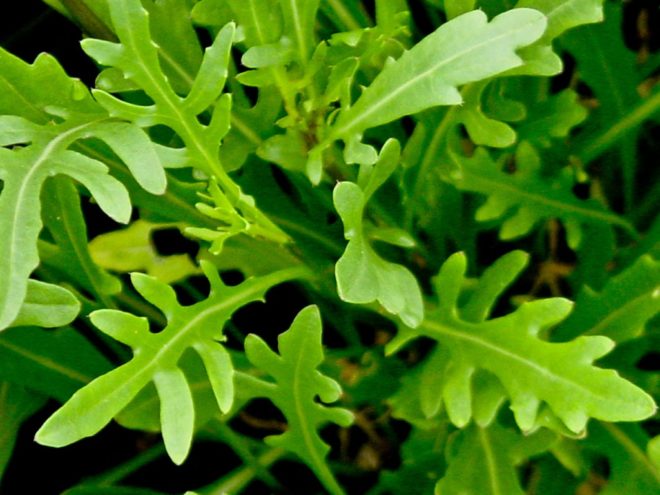
Calorie content and composition
Arugula is a very light, dietary herb with only 25 calories per 100 g of plant. But its chemical composition is extremely diverse, since the grass contains:
- riboflavin;
- B vitamins and vitamin K;
- vitamins A, C, PP;
- iron, sodium, zinc, manganese, potassium, calcium and phosphorus;
- a nicotinic acid;
- iodine;
- thiamine;
- fatty acids and fiber;
- essential oils.
At the same time, the vitamins in arugula are contained in a very high concentration, and even a small amount of lettuce leaves is a huge benefit.
Why arugula is useful for the body
The beneficial effect of the plant on the human body is manifested in almost all areas of health. Namely, the spicy herb:
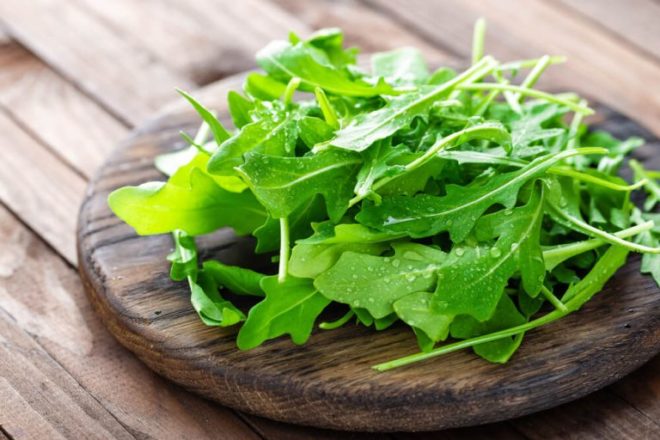
- has a positive effect on the stomach and helps with gastritis, ulcers, digestive disorders;
- calms the nerves well and helps to endure prolonged stress more easily;
- lowers sugar levels, strengthens blood vessels, maintains the health of the heart system;
- improves immunity - resistance to viruses and infections becomes higher;
- helps to strengthen hair and nails, stimulates the renewal of skin cells;
- accelerates the healing of various injuries - corns, cuts, irritations and ulcers.
Benefits of arugula for women
The value of the plant for the female body is that arugula:
- promotes weight loss when using salad in dietary nutrition;
- improves the appearance of a woman, as it has a beneficial effect on the skin, hair and nails.
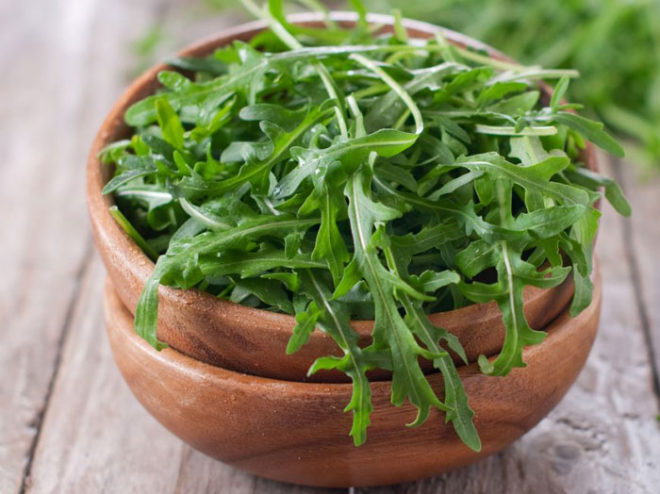
The benefits of arugula for men
Since ancient times, the plant has been known as a powerful aphrodisiac - this is its main benefit for men. Regular use of lettuce leaves improves potency, and in addition, generally accelerates blood circulation, protecting the body from heart attacks and strokes.
Can arugula be used during pregnancy and breastfeeding
Despite all the benefits of salad, the plant is almost contraindicated for pregnant women.The components in its composition provoke increased uterine contractions, and if there is at least a small probability of miscarriage, it is better to refuse arugula.
But when breastfeeding, the plant usually benefits - also in small dosages. It enhances lactation, so it will be especially beneficial for young mothers who have difficulty in producing breast milk.
The plant is also safe for small children - you can add it to baby's food from 1 year of age.
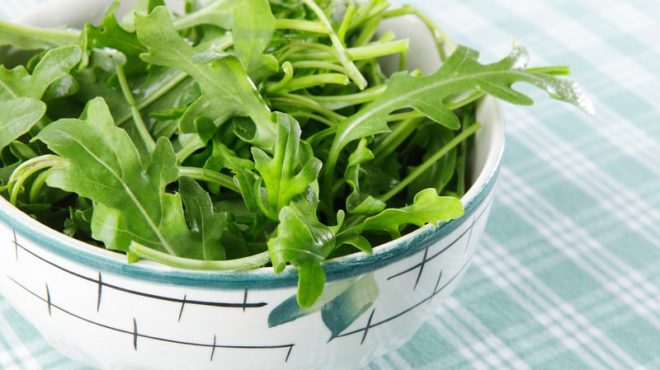
Arugula for weight loss
During the diet, spicy salad is of exceptional benefit. Despite its low calorie content, arugula contains a balanced amount of carbohydrates, fats and proteins, and therefore qualitatively supports the body's strength.
In addition, the plant improves metabolic processes and has a positive effect on the acid balance in the stomach. Considering that many diets become an ordeal for the body, the introduction of herbs into the diet is more than justified.
Traditional medicine recipes with arugula
Thanks to the benefits of arugula, it is actively used in home medicine. The healing properties of arugula are manifested:
- with diseases of the intestines and genitourinary sphere;
- with metabolic disorders and high blood cholesterol;
- with diabetes mellitus;
- with depression and chronic fatigue;
- with increased pressure;
- with a lack of iron and low hemoglobin;
- with obesity;
- with diseases of the joints and spine.
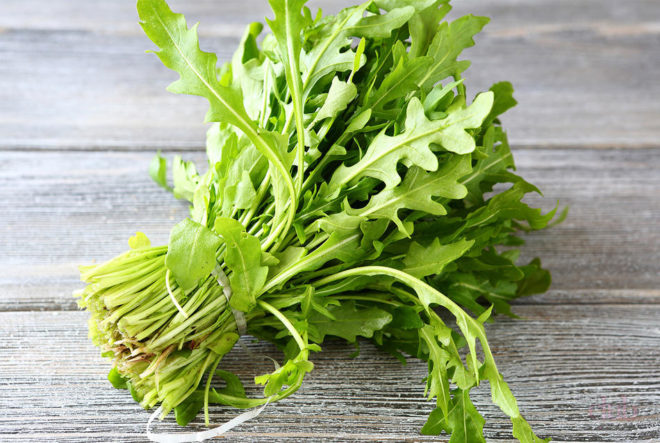
Also, the plant is useful during colds - it will help to quickly cope with the virus, promote productive coughing and increase immunity. You can simply consume it with food - it will be beneficial in any case. However, there are several specific recipes based on arugula.
Infusion of arugula for influenza
For a severe cold with a high fever, a regenerating agent made from spicy lettuce leaves will help. They make the broth like this - a handful of plant leaves are poured with boiling water, and then insisted for 5 - 6 hours. The finished drink is consumed warm three times a day.
Arugula leaves to increase potency
One of the most popular recipes is a means to increase male libido. 100 g of plant leaves are ground to a homogeneous mixture, mixed with 10 g of liquid honey and 10 g of hot black pepper is added. Take the remedy in a teaspoon in the morning.

Arugula ointment for wounds, abrasions and abscesses
Since the plant effectively heals skin lesions, a healing ointment is prepared from it. Green leaves are ground into a gruel, and then applied to a sore spot for several hours. For reliability, you can attach gauze or bandage on top. A natural ointment disinfects damage and promotes rapid wound healing.
The use of arugula in cosmetology
The rich composition of arugula makes it an extremely valuable ingredient in home care products. Vitamins and microelements in the leaves of the plant nourish the skin, have a rejuvenating effect, and help eliminate irritations.
To even out complexion and remove freckles, the following mask is used:
- finely chopped leaves of the plant are mixed with olive oil;
- the product is removed for 2 weeks in a dark and cool place.
After the mixture is well infused, it is applied to a cotton swab and wiped the face several times a week, paying special attention to problem areas.

A scrub mask helps with acne and blackheads.
- A few fresh leaves of the plant are chopped and mixed with a finely chopped fresh tomato.
- Then add a teaspoon of oatmeal to the mixture.
- The mask is insisted for about 10 minutes, and then evenly spread over the face and kept for 15 minutes until rinsing.
Benefits and uses of arugula oil
The seeds are cold pressed into a healthy and tasty oil. Its value is in no way lower than that of fresh leaves - it also helps with a wide range of gastric, vascular and nervous diseases.
For medicinal purposes, it is customary to consume oil a teaspoon twice a day before meals - or simply add it to salads and other dishes. Arugula oil for hair is highly prized - there are several useful cosmetic recipes based on it.
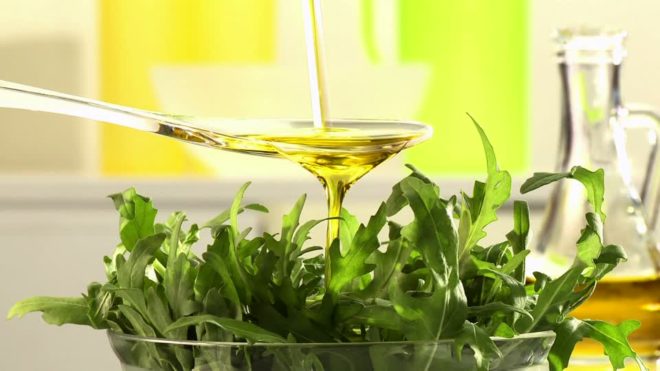
- If your hair becomes too brittle and begins to fall out, you can rub the oil into your scalp - every night for a couple of weeks. The product is kept on the hair for half an hour, then washed off with shampoo.
- The oil can be used to lubricate eyebrows and eyelashes - they will become thicker and more expressive. The product is applied with a cotton swab or cotton swab, leaving the oil on the eyebrows or on the tips of the eyelashes for an hour. Before going to bed, it is better to wash - otherwise, the product may stain the pillow or get into the eyes.
How to use arugula
Talking about the medicinal and cosmetological benefits of the plant, one cannot but touch on cooking. Fresh arugula leaves and seed oil can enhance the flavor of almost any dish.
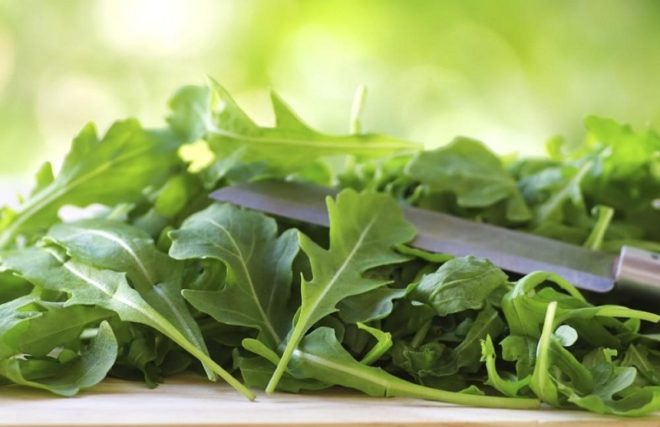
- Very often, the plant can be found in vegetable salads - as an ingredient or as an oil dressing.
- Lettuce leaves complement meat and fish dishes, seafood - they give the products a piquant bitterness and a very appetizing aroma.
- You can use fresh leaves on sandwiches to decorate pizza slices.
- Sometimes the herb is found in cottage cheese - it gives it an unusual taste and increases the benefits of the product.
- The plant is often an ingredient in hot sauces.
The benefits of arugula salads
Fragrant green leaves look especially organic in salads. What are the valuable properties of vegetable snacks when this plant is added?

- The salad will be extremely beneficial for the stomach - it will help speed up metabolism and eliminate digestive problems.
- Arugula in a salad will help reduce high blood pressure, normalize sugar levels, and restore the body's water-salt balance.
- Leaves saturated with vitamins in the autumn-winter period will not only help protect against colds, but also give vigor and strength.
How to choose the right arugula
The benefits of arugula directly depend on its quality. When choosing a plant, you need to look mainly at:
- Leaf size. Small leaves are always more bitter and pungent, while larger ones have a mild taste. The choice here depends on personal preference.
- The freshness of the plant. You need to choose extremely strong, young leaves that have not begun to fade.
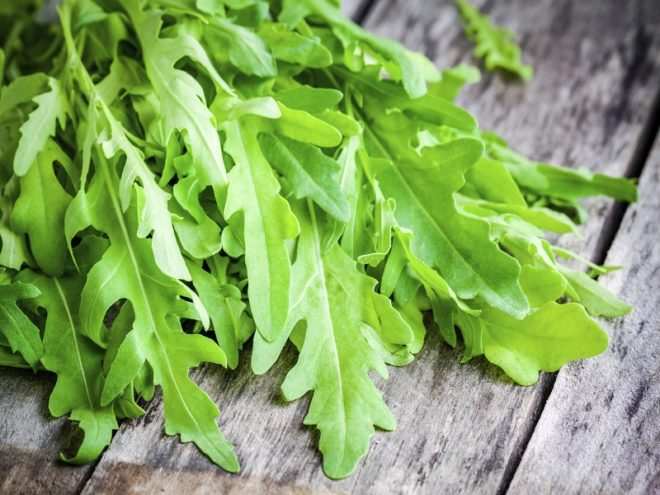
How to save arugula for the winter
If a fresh plant is available only in summer, and you cannot buy it in winter, then the question arises - is it possible to keep arugula edible for several months? There are two ways to do this.
- Freezing... Fresh leaves are thoroughly washed, wait for the water to dry, and then cut into thin strips, packaged in plastic bags and put into the freezer. If you freeze arugula, then it will calmly survive the winter, and its benefits will remain.
- Drying. The washed greens should be cut into strips and laid out in a thin layer to dry in a warm place, but away from direct sunlight and with good ventilation. Drying will take about a week, after which the dry leaves will need to be folded into a clean jar, closed with a lid and removed to a dark place.

Potential harm of arugula and contraindications
The benefits of arugula do not negate the fact that it can be harmful for certain diseases. You cannot use the plant when:
- allergies to arugula leaves or oil;
- serious liver disease;
- colitis and increased acidity in the stomach;
- chronic kidney disease and especially - with urolithiasis.
Pregnant women need to be careful with arugula.
Conclusion
The benefits and harms of arugula depend on whether there are specific contraindications to the use of this salad. If not, arugula will have a healing effect on the entire body and help take care of the skin and hair.
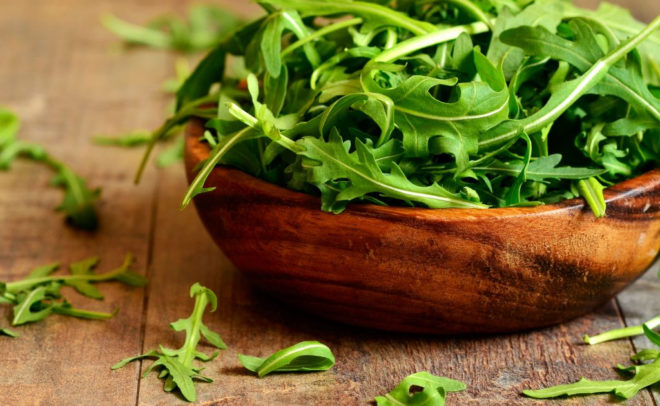
Reviews

